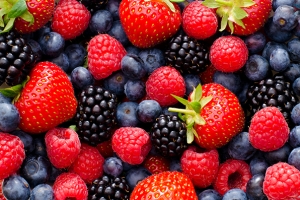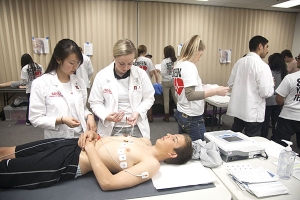The Sweet Tooth of America's Children
Added Sugars

White sugar, brown sugar, honey, molasses, brown rice syrup and high-fructose corn syrup—what do these foods have in common? They are all contributing to our children’s waistlines. In fact, the combination of eating too much sugar and the amount of “hidden” sugars in our children’s diets is a major culprit in the increase of childhood obesity.
How many grams of sugar a day is healthy for your child? Added sugars should add up to only 10 percent of the calories in your child’s daily diet. That means the average child should consume no more than 30-42 grams or 7-11 teaspoons of added sugars per day. To give you an idea of what this looks like, one 12-ounce can of soda contains 9 teaspoons of sugar.
Sadly, between 1970 and 2005, sugar intake has jumped over 20 percent. Our children are now consuming up to 30 teaspoons of cane and beet sugar, high-fructose corn syrup, dextrose, honey and other sweeteners per day, adding up to an extra 300 to 400 empty daily calories of the sweet stuff. These added sugars crowd out healthy foods, which could cause nutritional deficiencies, or they add extra (empty) calories to a child’s diet contributing to possible weight gain.
Sugar-Sweetened Drinks and Fruit Juices
Although Coke, Pepsi, Sprite and other sweetened beverages are the number one source of added sugars in most children’s diets, fruit juices follow close behind. Fruit juices are marketed as a healthy alternative to eating the whole fruit, and while most fruit juices contain vitamins and minerals, such as calcium, they are essentially liquid (fruit) sugar with less nutritional value than whole fruit. Furthermore, children consume more calories in liquid form than they do in solid and these extra calories are most likely stored as fat.
According to the American Academy of Pediatrics, children commonly over-consume fruit juices, which “offer no nutritional advantage over whole fruit for children over 6 months of age.” Juice lacks fiber and contain simple carbohydrates that rapidly enter the blood stream, causing a spike in blood sugar levels.
You should limit your child’s intake of sweetened beverages and naturally sweet beverages, such as fruit juice, to 4 to 6 oz. per day for children between 1 to 6 years of age, and 8 to 12 oz. per day for children 7 to 18 years of age.
High-Fructose Corn Syrup
Is high-fructose corn syrup (HFCS) the “villain” of sugars? Currently there are no comparative studies showing that HFCS is better or worse than any other sugar. However, researchers at University of Texas Southwestern Medical Center found that the liver will convert HFCS to fat more readily than table sugar. In addition, recent studies support the theory that consuming more calories from HFCS increases fat production in the body, with no relation to the total amount of calories consumed.
Consumption of HFCS has increased 1000 percent between 1970 and 2000 according to the US Department of Agriculture. On average, most children consume between 132 to 316 HFCS calories per day, which can be directly correlated to the rise in obesity.
Refined Sugar in Our Children’s Diets
What was once considered a treat has now become commonplace in the diets of most children in the United States. This trend continues into adulthood. In fact, the average person in the United States consumes more than 125 pounds of refined sugar per year, which computes to an average of 46 teaspoons per day.
Excessive sugar in our children’s diets is not only dangerous but can lead to a wide variety of health issues, such as obesity, cardiovascular disease, suppression of immune system and type 2 diabetes. Current studies also suggest that excessive sugar intake can impair a child’s ability to learn.
A Sugar By Another Name
Many foods that your child consumes on a daily basis are high in refined sugars: candy (any type), “white” carbohydrates (white bread, white pasta, etc.); condiments (ketchup, mayonnaise, sweet relish, etc.); fruit-flavored yogurts, breakfast cereals, pancake syrup, pre-made baked goods and pre-packaged and processed foods. You should avoid or strictly limit these foods in your child’s diet.
Tips To Reduce Added Sugars
Carefully check the labels of canned, prepared and pre-packaged foods for added sugars.
Replace refined grains like white bread, white flour and white rice with whole grain versions.
When buying breakfast cereal, cereal bars, fruity drinks, yogurt and fruit snacks, choose those without added sugar or very low sugar levels.
Choose carbohydrate-rich foods that are nutrient-dense like fruits, vegetables and beans. Think whole fruits, like oranges and apples, carrot and celery sticks and creamy hummus dip.
Avoid purchasing pre-sweetened drinks such as sodas or other sweetened drinks. Get your kids used to drinking water 90 percent of the time. Offer sparkling water sweetened with a little bit of low-sugar fruit juice.
--------------------------
Janet Little is a Certified Nutritionist with Henry’s Farmers Markets.



















